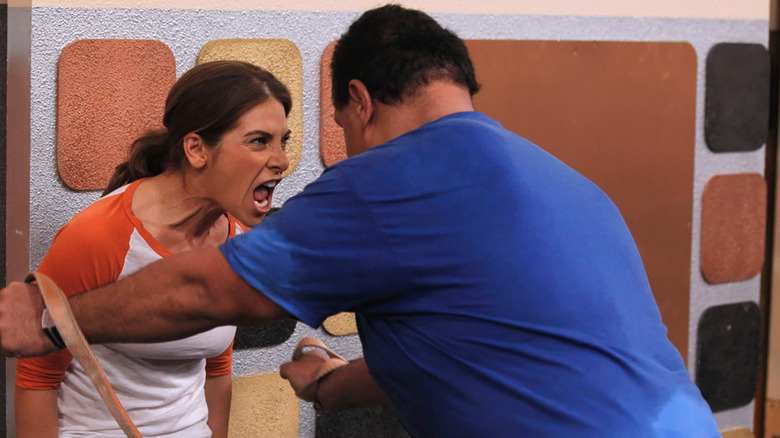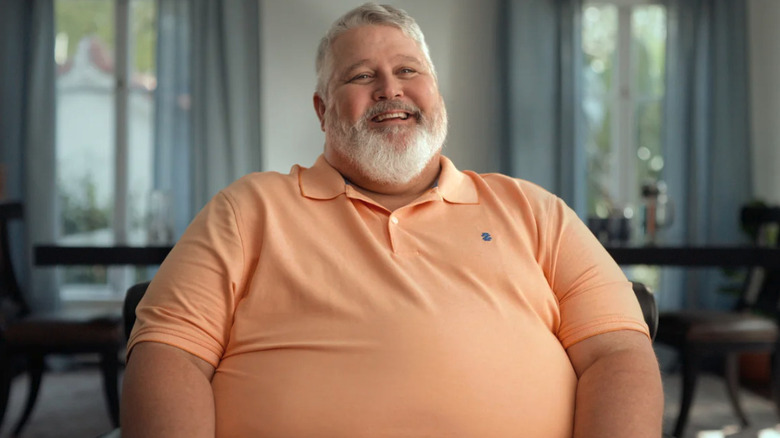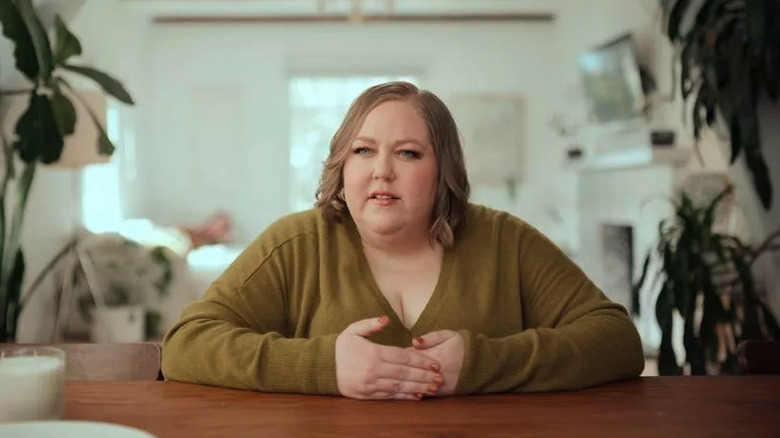Netflix's Biggest Loser Doc Exposes One Of The Most Evil TV Shows Ever Made
Nearly 10 years ago, I was cast in a production of "Silence!," the musical parody of the Academy Award-winning classic, "The Silence of the Lambs." I played Catherine Martin, the kidnapped daughter of a United States Senator, whom Jame "Buffalo Bill" Gumb kept in a hole and starved in the hopes that rapid weight loss would loosen up her skin enough to make a woman suit out of her. Gumb famously asks, "Are you about a size 14?" while kidnapping her, and the musical has an entire hoedown-style song with that question as the chorus.
When I played the role, I was the same size I am now, a 26, nearly double the dress size of a woman deemed so fat that her excess skin could be used as fabric. In the tradition of musical theater double-casting, I also played the corpse of Fredrica Bimmel, the woman Gumb gleefully identifies to Agent Clarice Starling as "a great big fat person."
I provide this anecdote because it's important to understand my perspective as a journalist who didn't come to the new Netflix documentary "Fit for TV: The Reality of The Biggest Loser" as someone unfamiliar with the ghoulish NBC reality show peddling dangerous, unattainable weight loss strategies as "entertainment," but as someone who survived the years when "The Biggest Loser" provided a public permission slip for viciousness. Online trolls, strangers on the street, and even well-meaning members of my family believed that disgracing me for my body was some kind of necessary tough love to inspire me to be "healthier" (read: thinner), and that fat bodies are problems meant to be fixed through pain and punishment because they saw how well it "worked" for contestants on the show.
"Fit for TV: The Reality of The Biggest Loser" is a long-overdue reckoning for one of the most evil reality shows in television history. But for fat people, there is no bombshell revolution because the ruthless treatment and unethical methods on display are ones rooted in an anti-fat belief system that society continues to perpetuate today.
The Biggest Loser set contestants up for failure
For those who missed "The Biggest Loser" (and therefore never lived in a home where the only sweet thing available was SnackWell's), it was a reality competition show that made its capital off the reckless treatment of fat people cast to compete against each other in a battle of extreme weight loss for a $250,000 prize. Some contestants were reportedly only consuming 800 calories a day and working out for 8+ hours to the point of vomiting, as coaches Bob Harper and Jillian Michaels (the latter of whom did not participate in the docuseries) barked "motivational phrases" like, "I don't care if people die on this floor, you better die looking good."
As producer JD Roth explained, "The Biggest Loser" wasn't looking for contestants who were fat and happy with their lives and bodies, but people who were at a place of desperation and saw the show as their last hope. Those who defend their work on the show genuinely believe they were "saving lives," even though there were multiple contestant hospitalizations, reports of permanent damage to their metabolisms, zero guidance once leaving the show, and, in the case of season 8 contestant Tracy Yukich — who said she joined the show in the hopes that weight loss could fix her marriage or fix her — nearly dying due to rhabdomyolysis.
What part of asking people to gorge themselves or build structures out of food using only their mouths to win the chance to call their loved ones at home is increasing life expectancy? How does treating fat people like a side show attraction by squeezing them into revealing clothing for the leering view of millions of people help anyone's health outcomes? In what universe does shaking the camera while a fat person falls off a treadmill to imply they "rattled the room" improve anyone's cholesterol levels?
"This is what America thinks is healthy and safe?" questioned season 2 contestant Suzanne Mendonca, who claimed she was allegedly asked to gain weight before the start of the show in the hopes that her transformation would be more dramatic for TV. "Producers loved that s***," said on-screen trainer Bob Harper. "They were like, 'We want 'em to puke! We want the madness of it all!'"
Safely losing weight is something that needs to be done gradually over time, which doesn't make for "good TV." That alone should have been a sign for the show to never exist in the first place. "People love making fun of fat people," season 7 contestant Joelle Gwynn rightfully pointed out. "The Biggest Loser" was never about health or wellness; it was a billion-dollar empire built on the foundation of a humiliation ritual.
The Biggest Loser's influence lingers on today
A savior appears in the docuseries in the form of Aubrey Gordon, author, co-host of the popular podcast Maintenance Phase, and the subject of the fantastic documentary "Your Fat Friend." She routinely called out the way the show not only harmed the contestants but also irreparably damaged society's relationship with fat people. "Nothing you do in your entire life will be celebrated as much as getting thin," she told the camera, a fact that I can attest to being disturbingly true as someone who has had dramatic weight fluctuations and survived pancreatic cancer. "The Biggest Loser" did not invent fatphobia, but it validated and amplified an already existing mindset in our society: that fat people are fair game for ridicule, and mistreatment is something we "deserve" for not being thin. It's a practice that continues today, as evident by any comment section of any video featuring a fat person — including clips from and the trailer for this docuseries.
Ironically, for as much as the show and those who made it conflated weight with health outcomes, Bob Harper experienced a "widow-maker" heart attack the year after the show was canceled, a testament that there are numerous factors that determine a person's health, not just weight. But it doesn't matter. The damage is done. It isn't just that "The Biggest Loser" taught fat people to feel badly about themselves, view the abusive treatment we receive by a fatphobic society as karmic retribution, engage in disordered eating, or resort to extreme methods if it means taking up less space in the world. It also taught millions of viewers at home to degrade fat people and take pleasure in our dehumanization. And the most heartbreaking part of it all is that millions of people, including those who competed on the show or made a fortune from working on it, still don't recognize how much damage the show caused.
"Fit for TV: The Reality of The Biggest Loser" is available to stream on Netflix.


